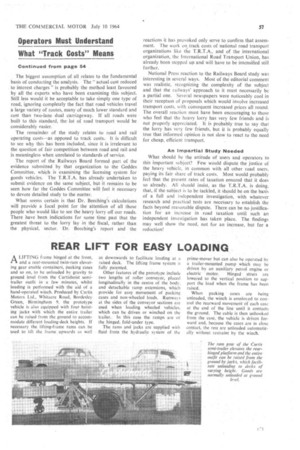Operators Must Understand What "Track Costs" Means
Page 59

If you've noticed an error in this article please click here to report it so we can fix it.
Continued from page 54
The biggest assumption of.allrelates to the fundamental basis of conducting the analysis. The actual cost reduced to interest charges" is probably the method least favoured by all the experts who have been examining this subject. Still less would it be acceptable to take simply one type of road, ignoring completely the fact that road vehicles travel a large variety_ of routes, many of much lower standard and cost than two-lane dual carriageway. If all roads were built to this standard, the' lot of road transport would be considerably easier.
The remainder of the study relates to road and rail operating costs—as opposed to track costs,It is difficult to see why this has been included, since it is irrelevant to the question of fair competition between road and rail and is meaningless when unrelated to standards of service.
The report of the Railways Board formed part of the evidence submitted by that organization to the Geddes Committee, which is examining the licensing system for goods vehicles. The T.R.T.A. has already undertaken to submit evidence on the same subject, but it remains to be seen how far the Geddes Committee will feel it necessary to devote detailed study to the matter.
What seems certain is that Dr. I3eeching's calculations will provide a focal point for the attention of all those people who would like to see the heavy lorry off our roads. There have been indications for some time past that the greatest threat to the lorry lay in the fiscal, rather than the physical, sector. Dr. I3eeching's report and the
reactions it has provoked only serve to confirm that assessment. The work on track costs of national road transport organizations like the T.R.T.A., and of the international organization, the International Road Transport Union, has already been stepped up and will have to be intensified still further.
National Press reaction to the Railways Board study was interesting in several ways. Most of the editorial comment was realistic, recognizing the complexity of the subject and that the railways' approach to it must necessarily be a partial one. Several newspapers were noticeably cool in their reception of proposals which would involve increased transport costs, with consequent increased prices all round. The overall reaction must have been encouraging to those who feel that the heavy lorry has very few friends and is not properly appreciated. It is probably true to say that the lorry has very few friends, but it is probably equally true that informed opinion is not slow to react to the need for cheap, efficient transport.
An Impartial Study Needed
What should be the attitude of users and operators to this important subject? Few would dispute the justice of the heavy vehicle, in common with all other road users, paying its fair share of track costs. Most would probably feel that the present rates of taxation ensured that it does so already. All should insist, as the T.R.T.A. is doing, that, if the subject is to be tackled, it should be on the basis of a full and independent investigation, with whatever research and practical tests are necessary to establish the facts beyond reasonable dispute. There can be no justification for an increase in road taxation until such an independent investigation has taken place. The findings may well show the need, not for an increase, but for a reduction!
























































































































